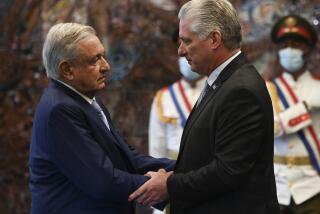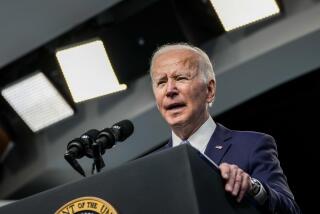Soviets Might Not Want ’86 Summit, Weinberger Says
- Share via
WASHINGTON — If President Reagan and Soviet leader Mikhail S. Gorbachev fail to carry out their plan for a summit meeting this year, “it would simply be because the Soviets are afraid to have one or don’t want to have one,” Defense Secretary Caspar W. Weinberger said Sunday.
Weinberger said during an appearance on ABC’s “This Week With David Brinkley” that Soviet officials, who want a fall meeting, “have made a lot of noises” objecting to Reagan’s desire to meet in Washington in June or July.
Under Reagan’s proposed schedule, the summit would take place before the American congressional campaign officially gets under way, thus reducing chances that developments from either event could affect the other.
“The President has been very flexible on dates and times,” Weinberger said, adding that “we want to have one and we hope very much there would be” a meeting.
Reagan indicated on Wednesday during a meeting with reporters that he expected to hold the Kremlin to the timetable he and Gorbachev set last November in Geneva, when they agreed at their first summit meeting to follow-up sessions this year in the United States and next year in the Soviet Union.
Asked if the wrangle over dates could derail the 1986 meeting, Reagan replied: “If it does slip through our fingers, I’ve got news for them: There won’t be an ’87 summit in Moscow.”
Weinberger did not mention the possible impact on relations with the Kremlin of Friday’s unprecedented U.S. order that the staff of the Soviet missions to the United Nations be reduced from the present 275 to 170 by April, 1988.
Tass, the Soviet news agency, promptly denounced the order as a “hostile” move. But the defense secretary defended it.
“I think it’s not an unfriendly act to get rid of some spies,” Weinberger said. “I think it’s a perfectly reasonable act. . . . They have twice as many people in the U.N. mission as virtually anybody else. . . . There’s just no question those people are there because they’re accomplished espionage agents trained as spies.”
Weinberger rejected the possibility of an eventual finding that the United States has no right under international law to order reduction of the Soviet missions.
“I can’t conceive of any lawyer saying that in a way that could possibly affect the sovereignty of the United States to have or have not the people in its borders that they wish,” said the secretary, a graduate of Harvard Law School.
Bruce Ammerman, a State Department spokesman, was ready with a prepared statement when asked to comment on the possible effect of the order on relations between Washington and Moscow or on plans for the 1986 summit.
“We see no reason why this step should impair U.S.-Soviet relations,” he said. “The size of the Soviet U.N. mission is not connected to U.S.-Soviet bilateral relations. We look forward to continuing our efforts to build on the results of the Geneva summit. There is no reason why this action should affect prospects for a summit meeting.”
More to Read
Sign up for Essential California
The most important California stories and recommendations in your inbox every morning.
You may occasionally receive promotional content from the Los Angeles Times.













